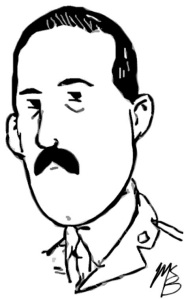Lieutenant Colonel D. F. Campbell, D.S.O., M.P.
2/7th Battalion, Duke of Wellington’s Regiment
I seldom press myself upon the House, and I will only to do so to-night for two or three minutes. I am actually one of only two soldiers left here to-night.
The thing is to get on with the War and banish everything that retards the progress of the War. I have had occasion several times to make criticisms of a military character during this War, but I have never done so in this House.
(Hansard, 10 Jan 1916, 1420)
Duncan Frederick Campbell was born on 28 April 1876 in in Simcoe, Ontario. After graduating from the University of Toronto in 1898, he received a commission to the Lancashire Fusiliers. Awarded the Distinguished Service Order for gallant service in the Boer War, Campbell retired from the Territorial Force in 1910. Following an unsuccessful political bid in the December 1910 British election, Campbell was elected Conservative Member of the British Parliament for North Ayrshire in a by-election one year later.
At the outbreak of the Great War, Campbell first rejoined his old regiment on the battlefields of France. While serving with the Black Watch, he lost his arm during the battle of Ypres in November 1914. Invalided to England for recuperation, the one-armed captain resumed his seat in Parliament.
Increasingly frustrated with the Opposition’s “voluminous verbiage” and criticisms of the war effort, Campbell singled out pacifist Liberal Robert Leonard Outhwaite for special rebuke:
I tell the House frankly that if I had the hon. Member for Hanley (Mr. Outhwaite) in my battalion at the front he would be strung up by the thumbs before he had been there half an hour.
“How many of your battalion would undertake to do it?” Outhwaite replied.
“I would leave that task to myself,” Campbell shot back, “even though I have the use of only one arm, having lost the use of the other one in a task which the hon. Member for Hanley would never dream of attempting or daring to risk.”
For Campbell the obstruction of pacifists like Outhwaite, “convey to foreign nations that we are not united at the present time.” Referring to the political situation in his home country, the North Ayrshire MP stated:
Let me take an example from the rest of the Empire. In Canada we have differences of opinion about the conduct of the War and about Conscription, and we see in this country this Mother of Parliaments with differences of opinion. What deduction do they draw from that? They draw the deduction of a very bad example.
In March 1916, Campbell was promoted to lieutenant colonel in command of a new battalion in the Duke of Wellington’s Regiment. He died in Southwold, Suffolk on 4 September after a short illness owing to his wounds. Lieutenant General Aylmer Hunter-Weston won the October 1916 for the vacant North Ayrshire seat.